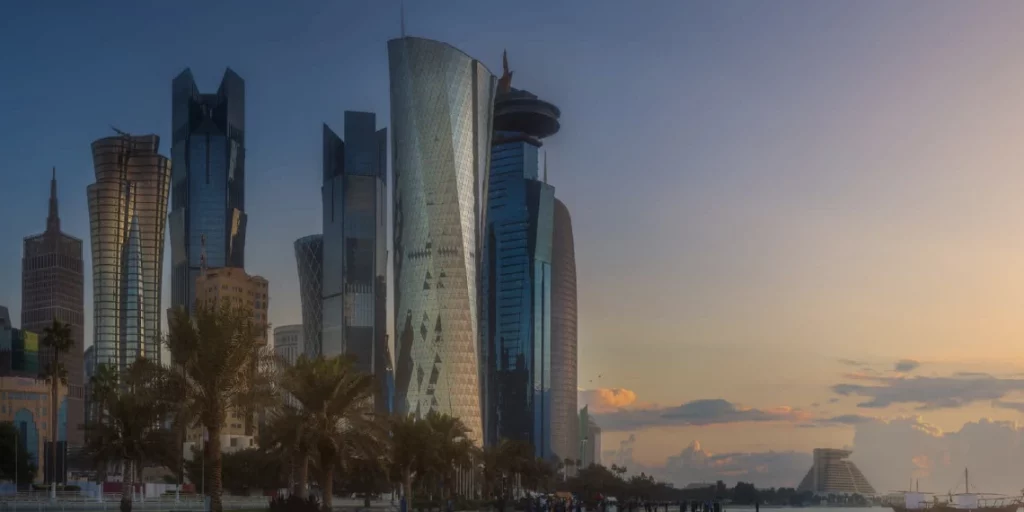Can Expats Buy Property In Qatar?
Yes, expatriates can buy property in Qatar under certain conditions. In 2004, Qatar passed a law allowing non-Qatari citizens, including expatriates, to own real estate in designated areas, primarily in residential zones known as “investment areas.” However, regulations regarding property ownership by expatriates are subject to change, and it’s essential to consult legal experts and relevant authorities for the most up-to-date information.
Additionally, there are restrictions on property ownership in certain areas, and expatriates typically need approval from the Ministry of Justice and other relevant government bodies.
It’s also crucial to consider the specific terms and conditions outlined in individual property agreements and contracts, as well as any potential changes in legislation that may impact property ownership rights for expatriates in Qatar.
The real estate market in Qatar stands as a beacon of opportunity within the Middle East, characterised by rapid growth, innovation, and a diverse range of investment options. This burgeoning sector serves as a focal point for both local and international investors seeking to capitalise on the country’s economic prosperity and strategic development initiatives.
According to Statista, Qatar’s Residential Real Estate Transactions market is poised for substantial growth. By 2024, the market value is projected to soar to US$2.10 billion. Further forecasts indicate an annual growth rate of 4.87% between 2024 and 2028, leading to an estimated market volume of approximately US$2.54 billion by the end of 2028. This surge is attributed to rising foreign investments by expats and government initiatives aimed at bolstering the sector’s growth.
The real estate market in Qatar has experienced significant expansion in recent years, driven by robust economic growth, ambitious infrastructure projects, and a thriving tourism sector. Boasting a unique blend of modernity and heritage, Qatar offers futuristic skyscrapers alongside traditional architecture. The capital city, Doha, serves as the epicentre of real estate activity, with residential, commercial, and mixed-use developments reshaping its skyline.
Qatar’s ambitious Vision 2030 agenda, aimed at diversifying the economy and fostering sustainable development, has propelled the construction of iconic landmarks such as the Lusail City project and the FIFA World Cup 2022 stadiums. These initiatives have elevated Qatar’s global profile and stimulated demand for real estate investments across various sectors.
Importance of understanding property ownership regulations for expats

For expatriates looking to invest or reside in Qatar, understanding property ownership regulations is crucial. While non-Qataris cannot directly own freehold land, they can purchase property in designated freehold zones such as The Pearl-Qatar and West Bay Lagoon. However, comprehensive knowledge of legal frameworks, taxation policies, and residency requirements is essential to ensure compliance and mitigate potential risks.
Understanding the nuances of property ownership regulations empowers expatriates to make informed investment decisions, navigate bureaucratic processes efficiently, and safeguard their interests in a foreign market. By staying abreast of regulatory developments and seeking guidance from legal and real estate professionals, expats can capitalise on the myriad opportunities presented by Qatar’s dynamic real estate sector while mitigating potential risks.
Qatar’s real estate market offers a wealth of opportunities for investors, driven by rapid growth, ambitious projects, and favourable investment conditions. Expatriates looking to participate in this dynamic market should familiarise themselves with property ownership regulations and seek professional guidance to make informed decisions and maximise their investment potential.
Legal framework and regulations governing property ownership for expats

In 2004, Qatar introduced Law No.17 of 2004 and Cabinet Decision No. 20 of 2004, allowing non-Qataris (including GCC nationals) to invest in specific real estate areas. These areas include the Pearl, West Bay Lagoon, and parts of Al Khor. According to this law, non-Qataris can acquire freehold interests in lands and residential units within these designated zones.
Additionally, non-Qataris are permitted to obtain usufruct rights for 99 years, with the possibility of renewal, in specified investment areas. These investment areas are delineated in Law No. 6 of 2006, covering zones within various districts such as Msheireb, Fariq Abdul Aziz, and Al Ghanim Al Atiq.
Other areas include Al Rifaa/Al Hitmi Al Atiq, Al Sulta, Bin Mahmoud, Rawdat Al Khail, Al Mansoura/Bin Dirham, Najma, Umm Ghuwailina, Al Khalifat, Al Saad, Al Mirqab Al Jadeed/Al Nasr, Doha International Airport, Al Qusar/Al Dafna/Onaiza, and Lusail/Al Khuraj/Jabal Thailab.
Reasons for Non-Qataris to Consider Real Estate Investment in Qatar

Investing in real estate in Qatar presents compelling advantages for non-Qatari individuals. Firstly, Qatar’s tax policies exempt property and net wealth taxes, alleviating financial burdens commonly associated with real estate ownership elsewhere. Though registration fees apply during property acquisition, the absence of recurring property taxes is a notable benefit.
The surge in Qatar’s real estate market, attributed to preparations for the FIFA World Cup, reflects extensive development efforts by the government. Investments in infrastructure, including hotels, stadiums, and transportation, have significantly increased demand for both residential and commercial properties.
Moreover, Qatar’s government relaxed regulations in 2020, allowing foreign investors to own real estate in designated areas like Lusail City. Previously, non-Qataris could only lease property, making this policy shift crucial for the growth of real estate ownership among non-Qatari individuals.
Investing in Qatar’s real estate offers attractive rental yields compared to many global cities, making it an appealing option for those seeking steady rental income.
Additionally, Qatar boasts a robust, stable economy supported by excellent infrastructure, including well-maintained roads, transportation networks, schools, and hospitals.
These amenities enhance the overall quality of life, making Qatar an attractive location for real estate investment. Furthermore, such amenities contribute positively to property values, increasing the desirability of investing in Qatar’s real estate market.
Investing in real estate in Qatar offers non-Qatari individuals numerous advantages, including tax exemptions, growth opportunities fueled by major events like the FIFA World Cup, relaxed ownership regulations, attractive rental yields, and a stable economy supported by excellent infrastructure.
Advantages of Investing in Real Estate for Non-Qatari Individuals

Qatar presents an enticing proposition for investors due to its liberal policies on profit repatriation. Without any constraints, both Qatari and Non-Qatari individuals can freely transfer their earnings, dividends, or profits back to their home countries. This absence of restrictions fosters a stable financial environment, instilling confidence in investors and stimulating foreign investment, thus contributing significantly to Qatar’s economic advancement.
In 2020, the Qatari government introduced a residency permit tailored to encourage real estate investment. Non-Qataris who invest in real estate valued at over QAR 1 million are eligible for this permit, granting them residency rights. This initiative not only attracts foreign investors but also offers them the opportunity to reside in Qatar and enjoy the privileges of being a resident.
To further incentivize substantial investments, Qatar offers extended residency permits and multi-entry visas. Longer residency permits enable Non-Qataris to prolong their stay in the country, providing stability and continuity for business endeavours. Simultaneously, multi-entry visas streamline frequent travel in and out of Qatar, facilitating business operations and personal convenience.
These incentives serve as rewards for significant investments, portraying Qatar as an accommodating destination for individuals seeking to establish themselves in the country.
Qatar’s investor-friendly policies, including unrestricted profit repatriation, real estate residency permits, and additional incentives like extended residency permits and multi-entry visas, create an environment conducive to foreign investment and economic growth.
Eligibility for Buying Property in Qatar

To be eligible for real estate residency in Qatar, there are specific conditions that individuals must meet. Firstly, the property being purchased must have a value exceeding QR 730,000, which is seven hundred and thirty thousand Qatari riyals. This minimum value requirement ensures that only those investing significantly in the real estate market can qualify for residency.
For individuals seeking permanent residency along with its associated benefits, the property’s value must be higher, exceeding QR 3,650,000, which translates to three million, six hundred and fifty thousand Qatari riyals. This higher threshold signifies a more substantial investment and commitment to residing in Qatar on a long-term basis.
It’s important to note that if the property being considered falls below the QR 730,000 threshold, non-Qatari individuals can still purchase it. However, in such cases, they will not be eligible to obtain residency rights. This distinction underscores the link between property investment and the acquisition of residency privileges in Qatar.
Overall, the requirements for real estate residency in Qatar are structured to encourage significant investment in the country’s property market. By setting minimum property value thresholds, Qatar aims to attract individuals who are committed to contributing to its real estate sector while also offering avenues for long-term residency and investment through higher-value property acquisitions.
Finding the Right Property in Qatar

For expatriates, discovering the ideal property in Qatar is both exhilarating and daunting. Navigating unfamiliar legalities and cultural nuances demands thorough planning and research. Purchasing property in Qatar offers excitement and rewards, but it necessitates meticulous planning and consideration to navigate the distinctive market and regulations successfully.
Identifying Suitable Properties
Identifying the perfect property involves aligning your needs, budget, and future plans with available options. Begin by defining your ideal lifestyle, whether it’s family-oriented, urban-centric, or seeking tranquillity in a quiet community. Translate these preferences into specific features such as a pool, nearby parks, or proximity to schools.
When considering your budget, it’s crucial to be realistic about financial limitations, including the purchase price, potential renovation costs, and ongoing maintenance expenses. This ensures a sustainable investment that doesn’t strain your finances.
Future plans play a pivotal role in property selection. Determine whether you intend to use the property for investment purposes or for personal use. This consideration significantly impacts factors like location and potential for development.
Researching freehold areas is essential, particularly in Qatar, where certain areas are designated for non-Qatari ownership. Understand the regulations governing these areas and monitor market trends to make informed decisions.
Utilise online platforms such as hapondo to explore property listings. Filter results based on location, type, price range, and desired amenities. These platforms offer a comprehensive view of available properties, allowing you to narrow down choices efficiently.
Stay abreast of market trends, property developments, and regulatory changes through news articles and reports from reliable sources. This information empowers you to make timely decisions and seize opportunities.
Consider various property types and their features. Apartments are suitable for urban living, offering convenience and easy maintenance, albeit with potentially limited space and privacy. Villas provide more privacy, outdoor space, and flexibility, but come with higher costs and maintenance responsibilities. Stand-alone houses offer ultimate privacy and customization but may be located further from amenities and entail significant upkeep costs.
Selecting the Right Location
Choosing the perfect location requires a deep dive into multiple facets to ensure it meets your needs and desires.
Start by understanding the community vibe. Investigate the neighbourhood’s atmosphere, demographics, and amenities. Whether you crave a tranquil, family-friendly setting or a lively, social environment, knowing the community vibe is essential.
Next, ponder accessibility and connectivity. Assess your transportation needs and the proximity to crucial spots like work, schools, healthcare, and entertainment. Explore public transport options, traffic flow, and potential road closures for seamless accessibility.
Furthermore, explore the area’s development and future potential. Research ongoing and planned projects to grasp the neighbourhood’s trajectory. Learn how potential infrastructure enhancements might influence property values and the local surroundings, offering insight into the area’s long-term prospects.
Also, factor in cultural considerations. Respect cultural norms and restrictions, particularly if transitioning from a vastly different background. Appreciating and accommodating cultural nuances can facilitate a smoother integration into the community.
In essence, choosing the right location entails a thorough examination of various factors. From grasping the community vibe to evaluating accessibility, development potential, and cultural nuances, each detail contributes significantly to determining a neighbourhood’s suitability. By meticulously researching and considering these aspects, you can make an informed decision that harmonises with your lifestyle and preferences.
Leveraging Trustworthy Real Estate Agents
When seeking a reputable real estate agent, it’s crucial to start by gathering recommendations from trusted sources. Ask friends, and colleagues, or participate in online communities where individuals share their experiences. This provides valuable insight into agents who have delivered satisfactory results.
Additionally, researching the reputation of agencies is essential. Look into their track record, client testimonials, and whether they specialise in the area and property type you’re interested in. This ensures you’re partnering with an agency that has a proven history of success and expertise in your specific requirements.
Checking the qualifications of an agent is non-negotiable. Verify that they are licensed and hold any relevant certifications. This assures you that they have met the necessary standards and are legally equipped to handle your real estate transactions.
Effective communication and transparency are foundational for a collaborative relationship with your agent. Choose an agent who actively listens to your needs, communicates clearly, and refrains from making unrealistic promises. This ensures that both parties are on the same page throughout the process.
In building a collaborative relationship, emphasise open communication. Clearly articulate your requirements, budget constraints, and preferences. Be open to the insights and expertise your agent provides, as they can offer valuable guidance based on their experience.
Transparency and trust are paramount. Request detailed information on properties of interest, including any potential risks associated with them. Discuss fees upfront to avoid misunderstandings later on. Ask questions to ensure you fully comprehend all terms and conditions before proceeding.
Expect your agent to be proficient in negotiation and provide comprehensive support. They should negotiate effectively on your behalf and offer assistance with legal and administrative matters. This ensures a smooth and successful real estate transaction from start to finish.
Challenges of Buying Property in Qatar
Purchasing property in Qatar presents opportunities such as tax exemptions and capital appreciation. However, expats face unique challenges in navigating this process. Legal restrictions, financing constraints, market dynamics, and practical considerations demand careful attention to ensure a successful investment venture.
1. Residency Requirements
Designated Freehold Areas: Non-Qataris are restricted to owning property solely in designated freehold areas. These areas are limited in number and may vary in availability over time due to development plans and government regulations.
The scarcity of such areas can significantly impact property options for expatriates, potentially influencing prices and investment opportunities.
Meeting Residency Requirements: In some designated freehold areas, there’s a prerequisite of a minimum residency period before non-Qataris can purchase property. This requirement aims to ensure a genuine commitment to residing in the country, promoting stability in the real estate market and contributing to the local economy.
Prospective buyers must carefully consider these residency criteria when planning their property investment in Qatar.
Visa Restrictions: Certain visa types may not qualify individuals for property ownership in Qatar. Visa regulations can vary, and some categories of visas may not confer the right to own real estate.
Expatriates seeking to invest in property must thoroughly understand the eligibility criteria associated with their visa status to avoid any legal complications or limitations when purchasing property in designated freehold areas.
2. Legal Restrictions
Residency Requirements: Non-Qataris are restricted to owning property solely in designated freehold areas, with eligibility often tied to meeting specific residency criteria particular to each area. These requirements may include minimum residency durations or employment statuses.
Adherence to these regulations is essential for expatriates seeking property ownership in Qatar, necessitating careful consideration and planning before initiating any transactions.
Leasehold vs. Freehold: Distinguishing between leasehold and freehold property ownership is critical for expats in Qatar. Freehold ownership grants complete control and ownership rights over the property indefinitely, while leasehold ownership entails possessing the property for a limited duration, typically subject to renewal or termination conditions.
Understanding the implications of each type of ownership is crucial for making informed decisions aligned with one’s long-term investment goals and preferences.
Complex Documentation: The legal procedures involved in property transactions in Qatar entail intricate documentation and procedures. From contract agreements to title deeds, navigating through these complex processes can be daunting for expatriates.
Seeking assistance from experienced legal professionals who understand the intricacies of Qatari property law is advisable to ensure compliance and mitigate potential risks associated with incomplete or erroneous documentation.
3. Financing
Limited mortgage options: Limited mortgage options for non-residents in Qatar often present a significant hurdle. Unlike local citizens, expatriates may find it challenging to secure mortgages due to stricter eligibility criteria imposed by financial institutions.
Even when mortgages are available, interest rates for non-residents tend to be higher, adding to the overall cost of borrowing. This limitation can deter potential buyers and restrict their ability to invest in the property market.
Down payment requirements: High down payment requirements further compound the financing challenges for expats. Many property transactions in Qatar require substantial upfront payments, which can strain the financial resources of buyers, especially those who may not have significant liquid assets readily available.
This barrier to entry may force some buyers to reconsider or delay their property investment plans.
Currency exchange: Fluctuations in currency exchange rates introduce additional uncertainty into the property purchase process for expatriates. As property transactions often involve transferring funds across borders, changes in exchange rates can impact the affordability of the property and potentially alter the overall financial dynamics of the investment.
Expats must carefully consider these currency risks when planning their property purchases to mitigate potential financial losses.
4. Market Knowledge and Transparency
Limited Market Information: Expatriates encountering Qatar’s property market may find accessing comprehensive and reliable data challenging. Without transparent market information readily available, making informed decisions becomes problematic.
This lack of transparency can lead to uncertainties regarding property values, rental yields, and overall market trends. Expats may need to rely on local connections, real estate agents, or specialised research services to gather relevant data for informed decision-making.
Hidden Fees and Charges: Expats should be wary of potential hidden fees and charges associated with purchasing property in Qatar. Developers and agents might not fully disclose all costs upfront, leading to unexpected expenses during the buying process.
These additional fees could include administrative charges, service fees, or even taxes that were not initially accounted for, impacting the overall affordability of the property. Understanding the full extent of these potential costs is crucial for budgeting and avoiding financial surprises.
Property Condition and Valuation: Assessing the true condition and value of a property in Qatar can be challenging for expatriates, especially without local expertise. Without firsthand knowledge of construction standards, building codes, and typical property conditions in the region, expats may struggle to accurately evaluate a property’s worth.
This can result in overpaying for a property or underestimating renovation costs, potentially leading to financial setbacks or dissatisfaction with the investment. Seeking guidance from local experts or conducting thorough property inspections can help expats make more informed decisions regarding property conditions and valuation.
Exit Strategies for Selling Property in Qatar

Selling property in Qatar, especially for expats, involves navigating a unique legal and cultural landscape. Understanding the process, key factors influencing value, and strategies for maximising returns can significantly impact your experience.
Exiting strategies for selling property in Qatar require a comprehensive understanding of the process, factors influencing resale value, and effective tips for maximising returns. As an expatriate (expat) navigating the Qatari real estate market, it’s essential to consider various aspects to ensure a successful and profitable sale.
Understanding the Process of Selling Property as an Expat
Selling property in Qatar as an expat involves several specific procedures that must be followed meticulously.
- Obtaining Necessary Permissions: Before initiating the sale of property in Qatar, expats must obtain approval from the Ministry of Municipality and Environment (MME). This includes submitting all required documents and ensuring compliance with legal obligations to facilitate a smooth transaction process.
- Engaging a Real Estate Agent: Working with a reputable real estate agent or broker is crucial for expats selling property in Qatar. These professionals play a vital role in marketing the property effectively, identifying potential buyers, and skillfully negotiating deals on behalf of the seller, thus streamlining the selling process.
- Setting an Asking Price: Determining the appropriate asking price is a pivotal step in the selling process. Expats must consider various factors, including prevailing market conditions, the property’s condition, its location, and recent comparable sales prices, to set a price that attracts buyers while maximising returns.
- Advertising and Marketing: Effective advertising and marketing strategies are essential to reaching a wide pool of potential buyers. Expats should utilise various channels such as online platforms, print media, and personal networks to showcase the property’s appeal. High-quality photographs, detailed property descriptions, and virtual tours can significantly enhance marketing efforts.
- Negotiating Offers: Upon receiving offers from interested parties, expats should carefully evaluate each proposal and engage in negotiations to secure terms that align with their financial objectives and timelines. Skilled negotiation is crucial in reaching a mutually beneficial agreement.
- Completing Legal Formalities: Once an agreement is reached, the transaction proceeds to the legal documentation stage. Both parties must sign a sales contract, and the transfer of ownership is formally registered with the relevant authorities to complete the process, ensuring legal compliance and a smooth transition of property ownership.
Factors Influencing Resale Value of Real Estate in Qatar
The resale value of a property in Qatar is influenced by several key factors, each playing a significant role in determining its market worth. Factors including location, property type, market conditions, and property condition collectively determine the resale value of a property in Qatar.
Understanding and strategically leveraging these factors can help property owners maximise their returns in the real estate market.
- Location: Location stands as a primary determinant, with properties situated in prime areas such as West Bay and The Pearl commanding premium prices due to their desirability and prestige. Proximity to amenities and infrastructure, such as schools, shopping centres, and transportation hubs, further enhances the property’s appeal and subsequently its resale value.
- Property Type: Property type also heavily impacts resale value. Detached villas typically fetch higher prices compared to apartments, owing to their larger space, privacy, and exclusive features. Factors like size, layout, and additional amenities such as pools or gyms contribute significantly to the perceived value of the property.
- Market Trends: Real estate market trends, including supply and demand dynamics, economic conditions, and government policies, affect property prices. Monitoring market trends helps sellers make informed decisions about timing their sales.
- Property Condition: The condition of the property itself plays a pivotal role. Investing in necessary renovations or upgrades can significantly enhance its curb appeal and attract potential buyers. Well-maintained properties with modern amenities and aesthetic appeal tend to command higher resale prices compared to those in need of repairs or updates.
- Infrastructure Development: Infrastructure projects, like transportation networks and commercial developments, enhance accessibility and convenience, increasing the desirability of nearby properties. Improved connectivity and access to amenities elevate the appeal of surrounding areas, leading to higher property values as demand increases due to improved quality of life and business opportunities.
- Legal Regulations: Alterations in legal regulations concerning property ownership and foreign investment can significantly influence buyer sentiment and property prices. Changes such as easing restrictions on foreign ownership can stimulate demand from international buyers, boosting property prices, while stricter regulations may dampen investor confidence and lead to a decrease in property values.
Tips for Maximising Returns
Maximising returns when selling a property requires careful planning and execution. Here are some tips to ensure you get the best value for your investment:
- Price it Right: Collaborate with your agent to set an asking price that reflects the current market conditions. Overpricing can deter potential buyers while underpricing might lead to missed opportunities. A competitive yet realistic price based on thorough market analysis is essential for attracting the right buyers.
- Presentation is Key: Create a lasting impression by showcasing your property’s best features. Invest in professional photography to highlight its unique aspects. Consider virtual tours to give potential buyers a comprehensive view of the property. Decluttering and staging can make spaces appear more inviting and spacious, enhancing their appeal.
- Marketing Strategy: Utilise the expertise of your agent to craft an effective marketing plan. Leverage online platforms like Hapondo, Property Finder Qatar, etc. to reach a wide audience of potential buyers. Tailor your marketing efforts to specific demographics, such as targeting families or investors, to maximise exposure.
- Negotiate Effectively: Be prepared to negotiate with potential buyers. Remain flexible and open to compromise while staying firm on your bottom line. Effective negotiation skills can help bridge the gap between buyer and seller, leading to a mutually agreeable price.
- Legal Compliance: Ensure all necessary documentation and approvals are in order before listing your property. This includes title deeds, NOCs (No Objection Certificates), and any relevant permits. Compliance with legal requirements helps prevent delays and complications during the sale process, providing a smoother transaction for all parties involved.
By following these detailed tips, you can increase the likelihood of maximising returns on your property sale while navigating the selling process with confidence.
Conclusion
In conclusion, Qatar’s real estate market presents abundant opportunities for foreign investors, offering them various ownership benefits, potential for property appreciation, and enticing incentives. Foreign investors enjoy strong ownership rights within Qatar, ensuring a secure and transparent legal framework for their real estate holdings.
The recent years have witnessed a remarkable surge in Qatar’s real estate market, indicating consistent growth in property value appreciation. This trend allows investors to not only generate rental income but also anticipate capital gains as property values increase over time.
Moreover, Qatar extends several benefits to foreign investors, including longer permits and multi-entry visas, facilitating their investment endeavours in the country. These provisions streamline the process for foreign investors, enhancing their confidence in Qatar’s real estate market.
Additionally, Qatar offers opportunities for investment in futuristic and luxurious areas such as Lusail City. This emerging development comprises opulent waterfront properties and commercial spaces, serving as a magnet for foreign investors seeking high-end opportunities in Qatar’s real estate sector.
Overall, Qatar’s real estate market stands as an attractive destination for foreign investors, boasting a combination of robust growth prospects, favourable ownership rights, and enticing incentives. With its transparent legal framework, steady property appreciation, and opportunities in prestigious developments like Lusail City, Qatar remains poised to continue attracting foreign investment in its real estate sector.